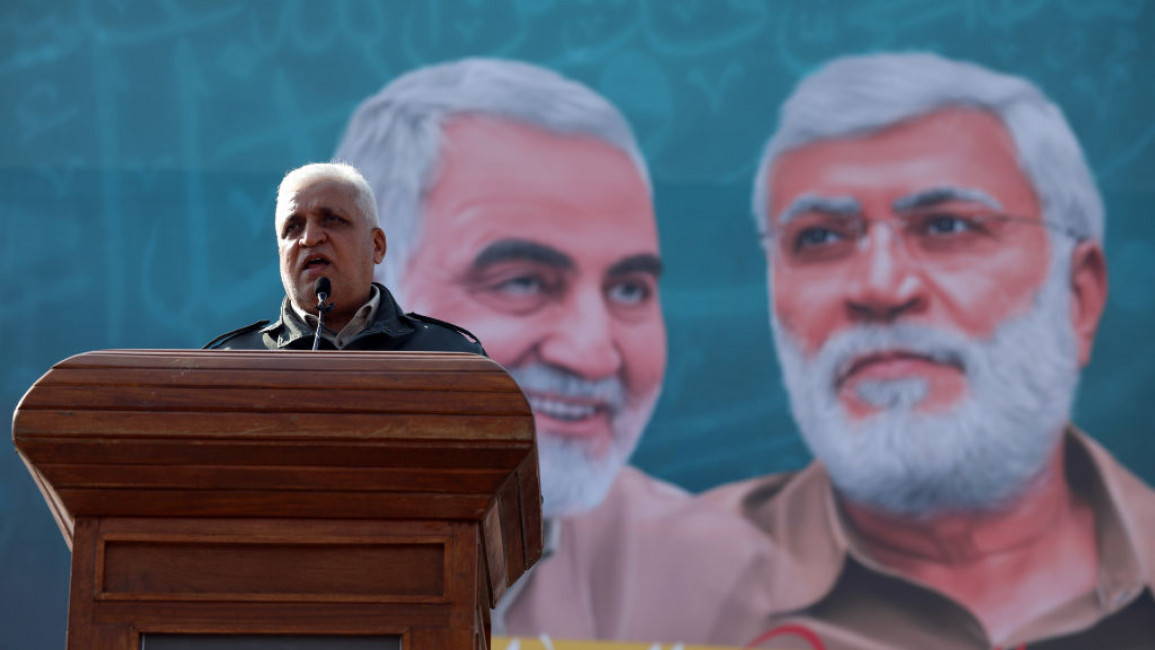Iraq grants investment rights to PMF-linked company for one million palm trees in Samawah Desert
Modern irrigation systems will be adopted in the controversial project of planting one million palm trees across two million dunums of land in the Southern Iraqi Samawah desert, the Iraqi agriculture ministry said, confirming that an Iran-backed company has been awarded to implement the questionable project that borders Saudi Arabia.
"The Samawah desert covers two million dunams and has been allocated for investment, specifically divided between Al-Muhandis General Company and Al-Safsaf Company to cultivate various varieties of dates," the Director-General of the Agricultural Investments Department at the Ministry of Agriculture, Ayad Al-Bulani, told the Iraqi News Agency (INA) on Friday, 22 December.
Al-Muhandis General Company is linked with Iraq's Popular Mobilization Forces (PMF). Although the PMF is officially related to the Iraqi government, some factions within the body take orders from Iran.
The Iraqi official said that modern irrigation systems and wells powered by solar energy would be used in implementing the project, claiming that Al-Muthanna Governorate is the strategic placement of this project, near the Saudi Arabian border, introduces complexities and sparks discussions regarding its feasibility, environmental considerations, and geopolitical implications.
One eye on Al-Hasakah and Haql Al-Omar, and another on the Samawa desert
— Raad Hashim (@raad_arabi) March 25, 2023
No fear for groundwater this time
to be assured Nuri al-Maliki ..
Badia Al Samawah, a project outside the scope of the usual armed factions operations!
What is the undisclosed goal?
Once again, A… pic.twitter.com/RF9RHYW7Ug
On 21 March 2023, PMF chairman Faleh al-Fayyad and PMF chief of staff Abdul-Aziz al-Mohammadawi attended the inauguration of the project that was granted to the PMF during a cabinet meeting of the Iraqi government of Prime Minister Mohammed Shia Al-Sudani in November 2022.
Al-Bulani clarified that there are various projects for investment in the agricultural sector, such as establishing factories, establishing green oases, and planting palms, olives, and jojoba plants on the sides of roads.
"The ministry has established a complete underground irrigation system called smart irrigation, dedicated to orchards, and its advantages include conserving water from waste and pumping water and fertilizer directly to the roots. This type of irrigation is suitable for palm trees and fruits," he added. "The ministry has also created wells powered by solar energy, and the water from these wells is distributed through pivot irrigation systems for the cultivation of strategic crops."
Saudi Arabia companies have previously proposed implementing such projects in the desert, but they abandoned them after pro-Iran militia groups launched a media campaign against the proposals.
Fayad has said that the project aims to take advantage of the vast areas of arable land, transform the desert into a food basket for Iraq, and provide many job opportunities for the unemployed. However, Iraqi and US scholars have raised questions about the project's feasibility, indicating that the Iranian-backed MPF might have stealth military aims behind the agricultural project.
"Yet the area chosen does not make much sense for such a project: it lacks sufficient water for the mass growing of palm and jojoba trees, and far more viable options exist between the Tigris and Euphrates Rivers," three well-known Scholars at The Washington Institute for Near East Policy have wrote in an analysis on March this year. "Tellingly, however, the area in question is strategically located on the border with Saudi Arabia. In 2021-22, Iraqi militias launched drones into Saudi territory and the United Arab Emirates from this area."
The Iraqi Minister, a controversial account on X platform with nearly a quarter of a million followers, alleged that Iran's Revolutionary Guards Corps is plotting to "construct an intelligence and military base beneath the palm trees."
The New Arab has contacted some lawmakers in the defence and security committee in the Iraqi parliament, but they were not available to comment.
Al-Bulani's statements are at odds with previous statements by Ahmed Munfi Jouda, the governor of Muthanna, who said in an interview with the National Iraqi News Agency (NINA) in July 2022 that the groundwater in the area "has been depleting in recent years".
"Lake Sawa is completely dry, with no water in it, and even the areas adjacent to the desert now require drilling to a depth of 120-110 meters to obtain water suitable for irrigation and agriculture," said Jouda.
He also added that Iraq's investment law does not prohibit any party from proposing a project, and he does not hinder investment in the province. Still, the issue is related to the Iraqi Ministry of Water Resources, which said the Samawah desert lacks sufficient water.
The city of Samawah, 280 kilometres southeast of Baghdad, is the modern capital of the Al Muthanna Governorate and is located on the Euphrates River.
Covering 75% of the Al-Muthanna Governorate's expanse, the Samawah Desert is predominantly uninhabited. The scarcity of water for agriculture and other human activities renders most of this desert area devoid of population.
Last year, Iraq's water resources ministry said that Lake Sawa in Muthanna province had dried up due to climate change and the building of illegal irrigation systems by farmers and landowners that used up water at nearby groundwater wells.
The lake was once a popular tourist destination and a haven for biodiversity, but shrinking rainfall and increased draining by landowners and farmers for agricultural use saw the lake shrivel in size in recent years.


![President Pezeshkian has denounced Israel's attacks on Lebanon [Getty]](/sites/default/files/styles/image_684x385/public/2173482924.jpeg?h=a5f2f23a&itok=q3evVtko)



 Follow the Middle East's top stories in English at The New Arab on Google News
Follow the Middle East's top stories in English at The New Arab on Google News


